Web Scraping with SeleniumBase and Python: A Complete Guide

Lucas Mitchell
Automation Engineer
05-Nov-2024
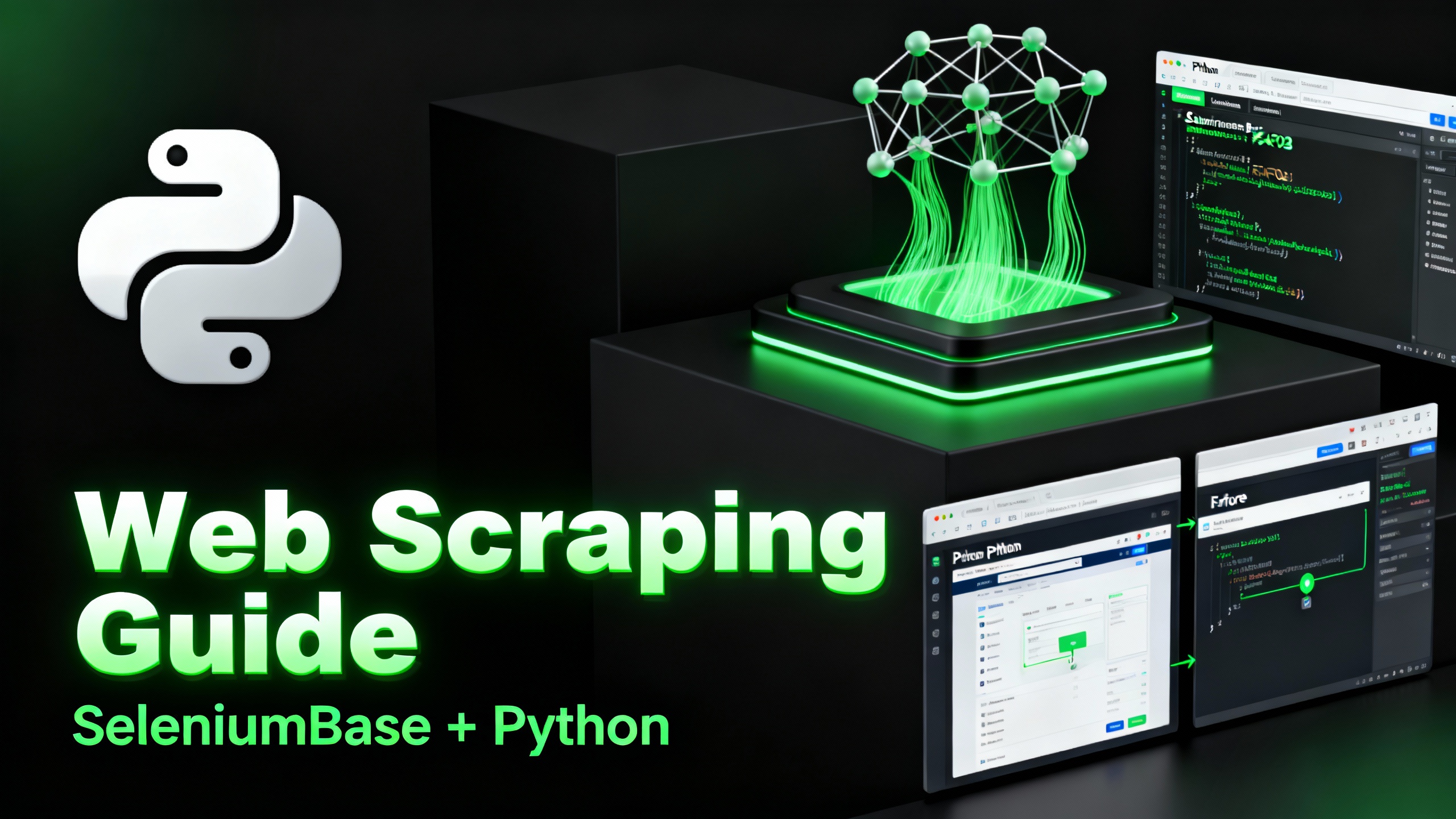
Web scraping is a powerful tool for data extraction, market research, and automation. However, CAPTCHAs can hinder automated scraping efforts. In this guide, we'll explore how to use SeleniumBase for web scraping and integrate CapSolver to solve CAPTCHAs efficiently, using quotes.toscrape.com as our example website.
Introduction to SeleniumBase

SeleniumBase is a Python framework that simplifies web automation and testing. It extends Selenium WebDriver's capabilities with a more user-friendly API, advanced selectors, automatic waits, and additional testing tools.
Setting Up SeleniumBase
Before we begin, ensure you have Python 3 installed on your system. Follow these steps to set up SeleniumBase:
-
Install SeleniumBase:
bashpip install seleniumbase -
Verify the Installation:
bashsbase --help
Basic Scraper with SeleniumBase
Let's start by creating a simple script that navigates to quotes.toscrape.com and extracts quotes and authors.
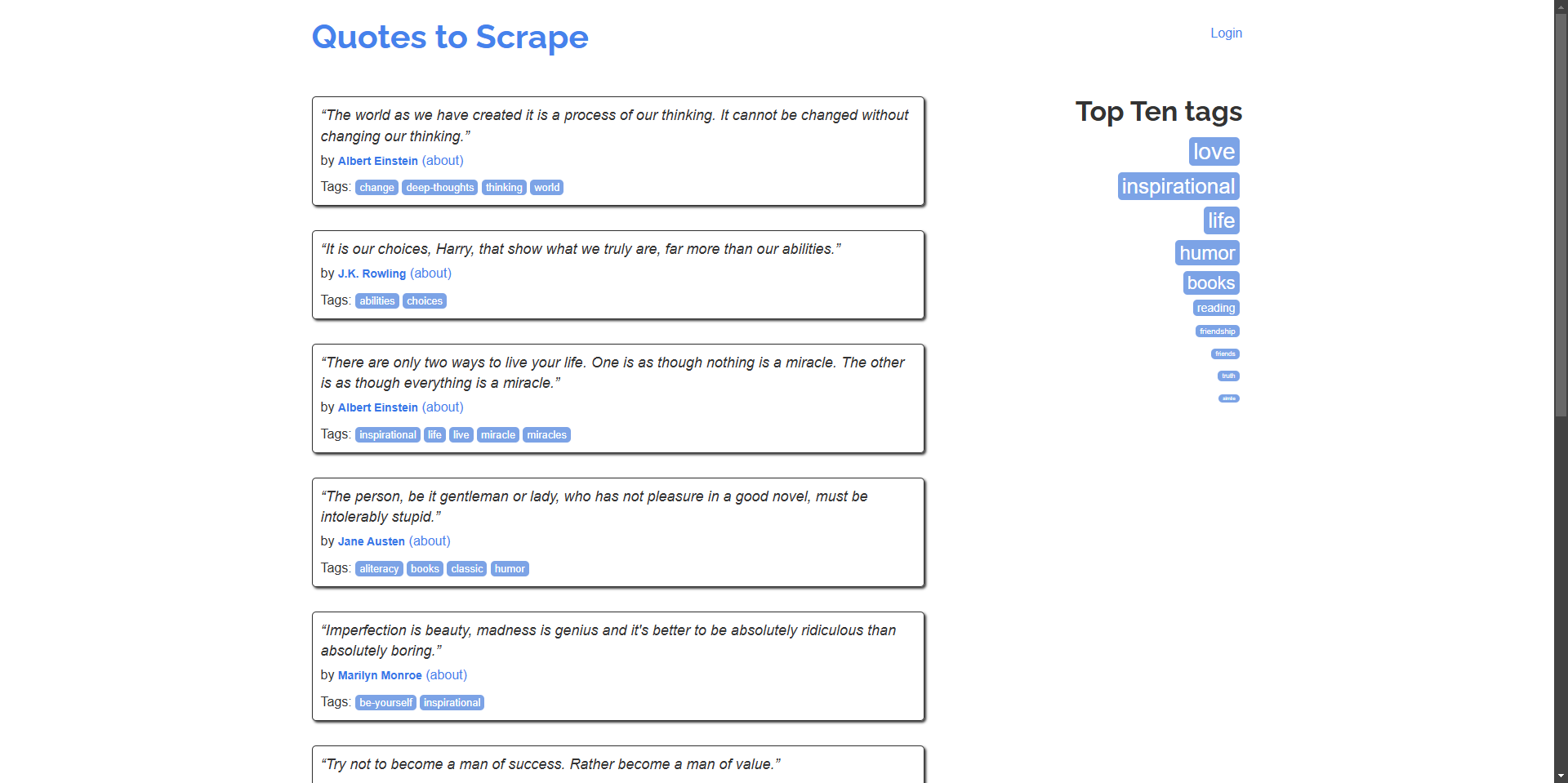
Example: Scrape quotes and their authors from the homepage.
python
# scrape_quotes.py
from seleniumbase import BaseCase
class QuotesScraper(BaseCase):
def test_scrape_quotes(self):
self.open("https://quotes.toscrape.com/")
quotes = self.find_elements("div.quote")
for quote in quotes:
text = quote.find_element("span.text").text
author = quote.find_element("small.author").text
print(f"\"{text}\" - {author}")
if __name__ == "__main__":
QuotesScraper().main()Run the script:
bash
python scrape_quotes.pyOutput:
“The world as we have created it is a process of our thinking. It cannot be changed without changing our thinking.” - Albert Einstein
...More Advanced Web Scraping Examples
To enhance your web scraping skills, let's explore more advanced examples using SeleniumBase.
Scraping Multiple Pages (Pagination)
Many websites display content across multiple pages. Let's modify our script to navigate through all pages and scrape quotes.
python
# scrape_quotes_pagination.py
from seleniumbase import BaseCase
class QuotesPaginationScraper(BaseCase):
def test_scrape_all_quotes(self):
self.open("https://quotes.toscrape.com/")
while True:
quotes = self.find_elements("div.quote")
for quote in quotes:
text = quote.find_element("span.text").text
author = quote.find_element("small.author").text
print(f"\"{text}\" - {author}")
# Check if there is a next page
if self.is_element_visible('li.next > a'):
self.click('li.next > a')
else:
break
if __name__ == "__main__":
QuotesPaginationScraper().main()Explanation:
- We loop through pages by checking if the "Next" button is available.
- We use
is_element_visibleto check for the "Next" button. - We click the "Next" button to navigate to the next page.
Handling Dynamic Content with AJAX
Some websites load content dynamically using AJAX. SeleniumBase can handle such scenarios by waiting for elements to load.
Example: Scrape tags from the website, which load dynamically.
python
# scrape_dynamic_content.py
from seleniumbase import BaseCase
class TagsScraper(BaseCase):
def test_scrape_tags(self):
self.open("https://quotes.toscrape.com/")
# Click on the 'Top Ten tags' link to load tags dynamically
self.click('a[href="/tag/"]')
self.wait_for_element("div.tags-box")
tags = self.find_elements("span.tag-item > a")
for tag in tags:
tag_name = tag.text
print(f"Tag: {tag_name}")
if __name__ == "__main__":
TagsScraper().main()Explanation:
- We wait for the
div.tags-boxelement to ensure the dynamic content is loaded. wait_for_elementensures that the script doesn't proceed until the element is available.
Submitting Forms and Logging In
Sometimes, you need to log in to a website before scraping content. Here's how you can handle form submission.
Example: Log in to the website and scrape quotes from the authenticated user page.
python
# scrape_with_login.py
from seleniumbase import BaseCase
class LoginScraper(BaseCase):
def test_login_and_scrape(self):
self.open("https://quotes.toscrape.com/login")
# Fill in the login form
self.type("input#username", "testuser")
self.type("input#password", "testpass")
self.click("input[type='submit']")
# Verify login by checking for a logout link
if self.is_element_visible('a[href="/logout"]'):
print("Logged in successfully!")
# Now scrape the quotes
self.open("https://quotes.toscrape.com/")
quotes = self.find_elements("div.quote")
for quote in quotes:
text = quote.find_element("span.text").text
author = quote.find_element("small.author").text
print(f"\"{text}\" - {author}")
else:
print("Login failed.")
if __name__ == "__main__":
LoginScraper().main()Explanation:
- We navigate to the login page and fill in the credentials.
- After submitting the form, we verify the login by checking for the presence of a logout link.
- Then we proceed to scrape the content available to logged-in users.
Note: Since quotes.toscrape.com allows any username and password for demonstration, we can use dummy credentials.
Extracting Data from Tables
Websites often present data in tables. Here's how to extract table data.
Example: Scrape data from a table (hypothetical example as the website doesn't have tables).
python
# scrape_table.py
from seleniumbase import BaseCase
class TableScraper(BaseCase):
def test_scrape_table(self):
self.open("https://www.example.com/table-page")
# Wait for the table to load
self.wait_for_element("table#data-table")
rows = self.find_elements("table#data-table > tbody > tr")
for row in rows:
cells = row.find_elements("td")
row_data = [cell.text for cell in cells]
print(row_data)
if __name__ == "__main__":
TableScraper().main()Explanation:
- We locate the table by its ID or class.
- We iterate over each row and then over each cell to extract data.
- Since
quotes.toscrape.comdoesn't have tables, replace the URL with a real website that contains a table.
Integrating CapSolver into SeleniumBase
While quotes.toscrape.com does not have CAPTCHAs, many real-world websites do. To prepare for such cases, we'll demonstrate how to integrate CapSolver into our SeleniumBase script using the CapSolver browser extension.
How to solve captchas with SeleniumBase using Capsolver
-
Download the CapSolver Extension:
- Visit the CapSolver GitHub releases page.
- Download the latest version of the CapSolver browser extension.
- Unzip the extension into a directory at the root of your project, e.g.,
./capsolver_extension.
Configuring the CapSolver Extension
-
Locate the Configuration File:
- Find the
config.jsonfile located in thecapsolver_extension/assetsdirectory.
- Find the
-
Update the Configuration:
- Set
enabledForcaptchaand/orenabledForRecaptchaV2totruedepending on the CAPTCHA types you want to solve. - Set the
captchaModeorreCaptchaV2Modeto"token"for automatic solving.
Example
config.json:json{ "apiKey": "YOUR_CAPSOLVER_API_KEY", "enabledForcaptcha": true, "captchaMode": "token", "enabledForRecaptchaV2": true, "reCaptchaV2Mode": "token", "solveInvisibleRecaptcha": true, "verbose": false }- Replace
"YOUR_CAPSOLVER_API_KEY"with your actual CapSolver API key.
- Set
Loading the CapSolver Extension in SeleniumBase
To use the CapSolver extension in SeleniumBase, we need to configure the browser to load the extension when it starts.
-
Modify Your SeleniumBase Script:
- Import
ChromeOptionsfromselenium.webdriver.chrome.options. - Set up the options to load the CapSolver extension.
Example:
pythonfrom seleniumbase import BaseCase from selenium.webdriver.chrome.options import Options as ChromeOptions import os class QuotesScraper(BaseCase): def setUp(self): super().setUp() # Path to the CapSolver extension extension_path = os.path.abspath('capsolver_extension') # Configure Chrome options options = ChromeOptions() options.add_argument(f"--load-extension={extension_path}") options.add_argument("--disable-gpu") options.add_argument("--no-sandbox") # Update the driver with the new options self.driver.quit() self.driver = self.get_new_driver(browser_name="chrome", options=options) - Import
-
Ensure the Extension Path is Correct:
- Make sure the
extension_pathpoints to the directory where you unzipped the CapSolver extension.
- Make sure the
Example Script with CapSolver Integration
Here's a complete script that integrates CapSolver into SeleniumBase to solve CAPTCHAs automatically. We'll continue to use https://recaptcha-demo.appspot.com/recaptcha-v2-checkbox.php as our example site.
python
# scrape_quotes_with_capsolver.py
from seleniumbase import BaseCase
from selenium.webdriver.chrome.options import Options as ChromeOptions
import os
class QuotesScraper(BaseCase):
def setUp(self):
super().setUp()
# Path to the CapSolver extension folder
# Ensure this path points to the CapSolver Chrome extension folder correctly
extension_path = os.path.abspath('capsolver_extension')
# Configure Chrome options
options = ChromeOptions()
options.add_argument(f"--load-extension={extension_path}")
options.add_argument("--disable-gpu")
options.add_argument("--no-sandbox")
# Update the driver with the new options
self.driver.quit() # Close any existing driver instance
self.driver = self.get_new_driver(browser_name="chrome", options=options)
def test_scrape_quotes(self):
# Navigate to the target site with reCAPTCHA
self.open("https://recaptcha-demo.appspot.com/recaptcha-v2-checkbox.php")
# Check for CAPTCHA presence and solve if needed
if self.is_element_visible("iframe[src*='recaptcha']"):
# The CapSolver extension should handle the CAPTCHA automatically
print("CAPTCHA detected, waiting for CapSolver extension to solve it...")
# Wait for CAPTCHA to be solved
self.sleep(10) # Adjust time based on average solving time
# Proceed with scraping actions after CAPTCHA is solved
# Example action: clicking a button or extracting text
self.assert_text("reCAPTCHA demo", "h1") # Confirm page content
def tearDown(self):
# Clean up and close the browser after the test
self.driver.quit()
super().tearDown()
if __name__ == "__main__":
QuotesScraper().main()Explanation:
-
setUp Method:
- We override the
setUpmethod to configure the Chrome browser with the CapSolver extension before each test. - We specify the path to the CapSolver extension and add it to the Chrome options.
- We quit the existing driver and create a new one with the updated options.
- We override the
-
test_scrape_quotes Method:
- We navigate to the target website.
- The CapSolver extension would automatically detect and solve any CAPTCHA.
- We perform the scraping tasks as usual.
-
tearDown Method:
- We ensure the browser is closed after the test to free up resources.
Running the Script:
bash
python scrape_quotes_with_capsolver.pyNote: Even though quotes.toscrape.com doesn't have CAPTCHAs, integrating CapSolver prepares your scraper for sites that do.
Bonus Code
Claim your Bonus Code for top captcha solutions at CapSolver: scrape. After redeeming it, you will get an extra 5% bonus after each recharge, unlimited times.
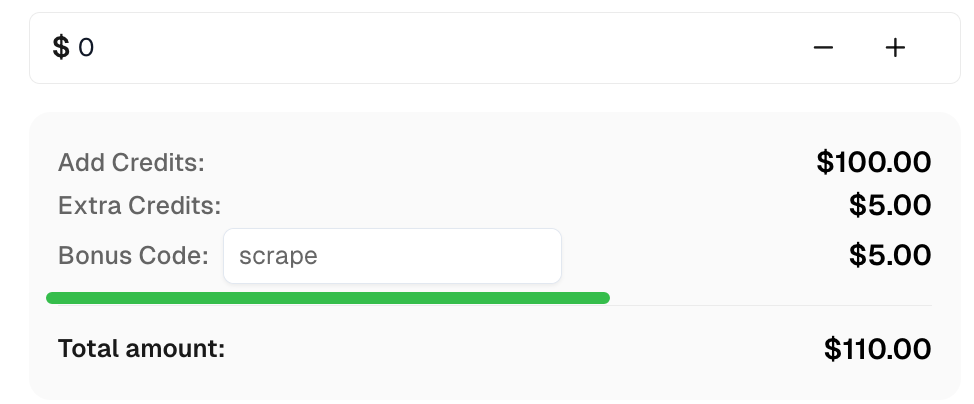
Conclusion
In this guide, we've explored how to perform web scraping using SeleniumBase, covering basic scraping techniques and more advanced examples like handling pagination, dynamic content, and form submissions. We've also demonstrated how to integrate CapSolver into your SeleniumBase scripts to automatically solve CAPTCHAs, ensuring uninterrupted scraping sessions.
Compliance Disclaimer: The information provided on this blog is for informational purposes only. CapSolver is committed to compliance with all applicable laws and regulations. The use of the CapSolver network for illegal, fraudulent, or abusive activities is strictly prohibited and will be investigated. Our captcha-solving solutions enhance user experience while ensuring 100% compliance in helping solve captcha difficulties during public data crawling. We encourage responsible use of our services. For more information, please visit our Terms of Service and Privacy Policy.
More
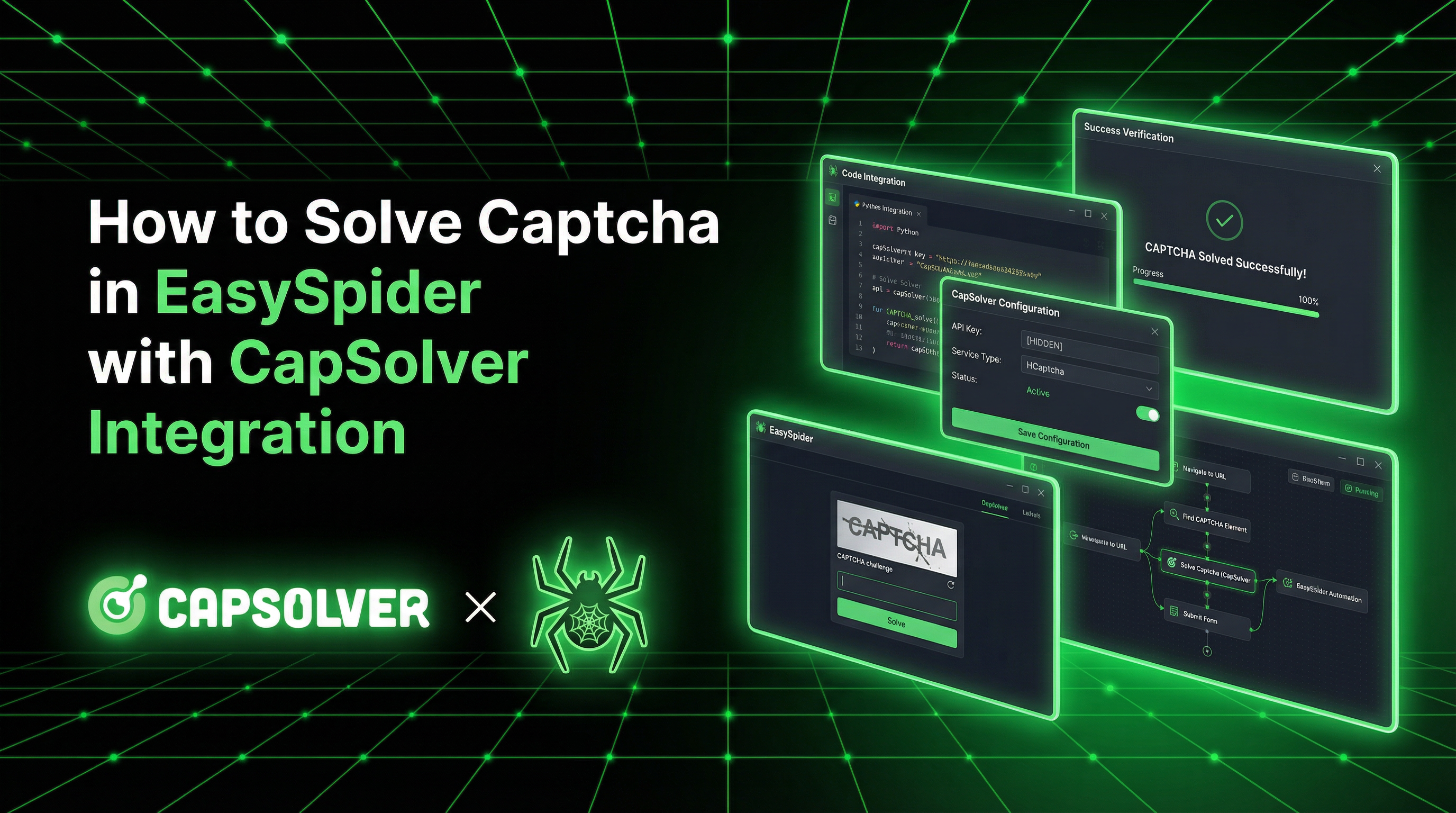
How to Solve Captcha in EasySpider with CapSolver Integration
EasySpider is a visual, no-code web scraping and browser automation tool, and when combined with CapSolver, it can reliably solve CAPTCHAs like reCAPTCHA v2 and Cloudflare Turnstile, enabling seamless automated data extraction across websites.

Lucas Mitchell
04-Feb-2026
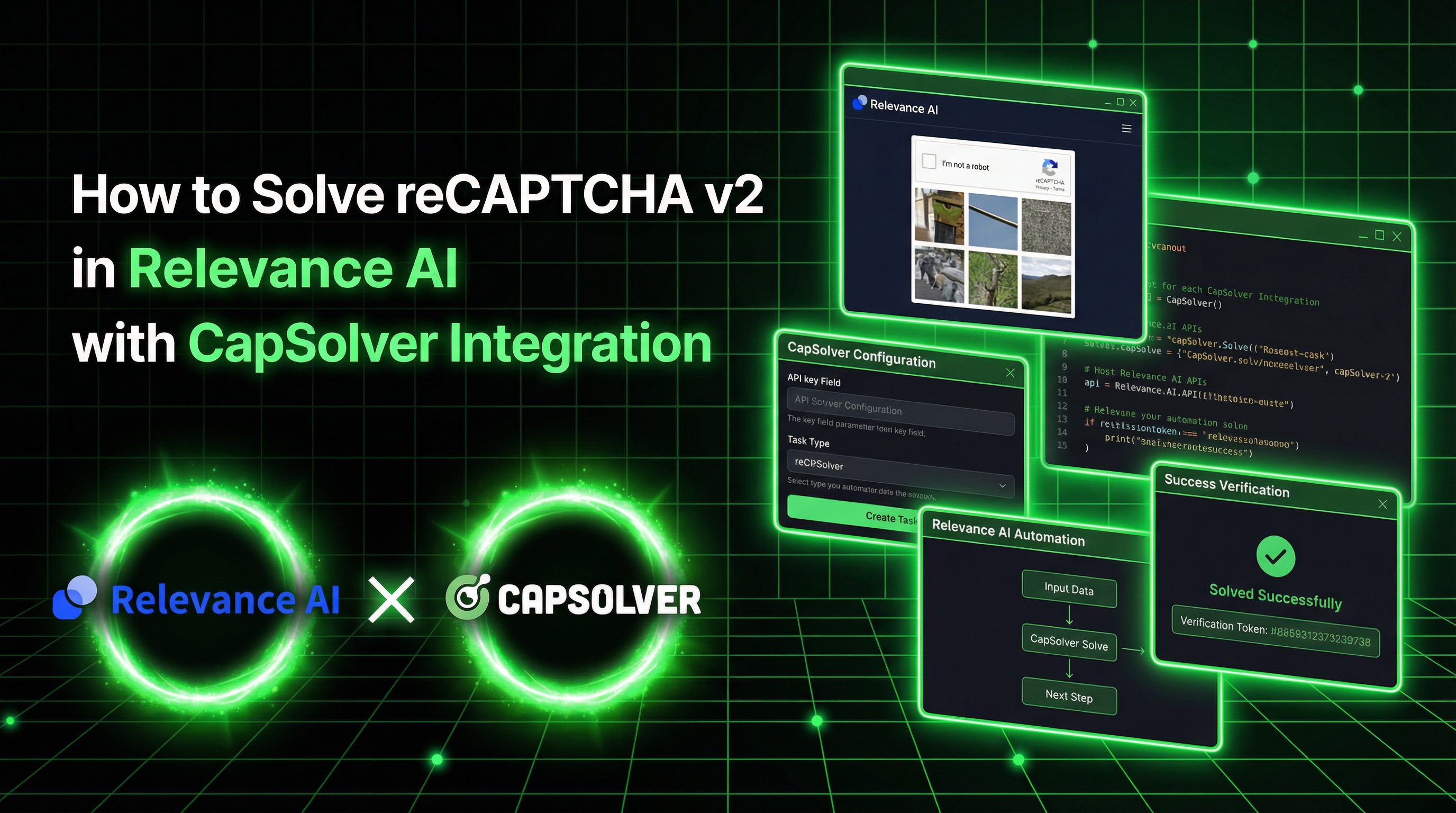
How to Solve reCAPTCHA v2 in Relevance AI with CapSolver Integration
Build a Relevance AI tool to solve reCAPTCHA v2 using CapSolver. Automate form submissions via API without browser automation.

Lucas Mitchell
03-Feb-2026
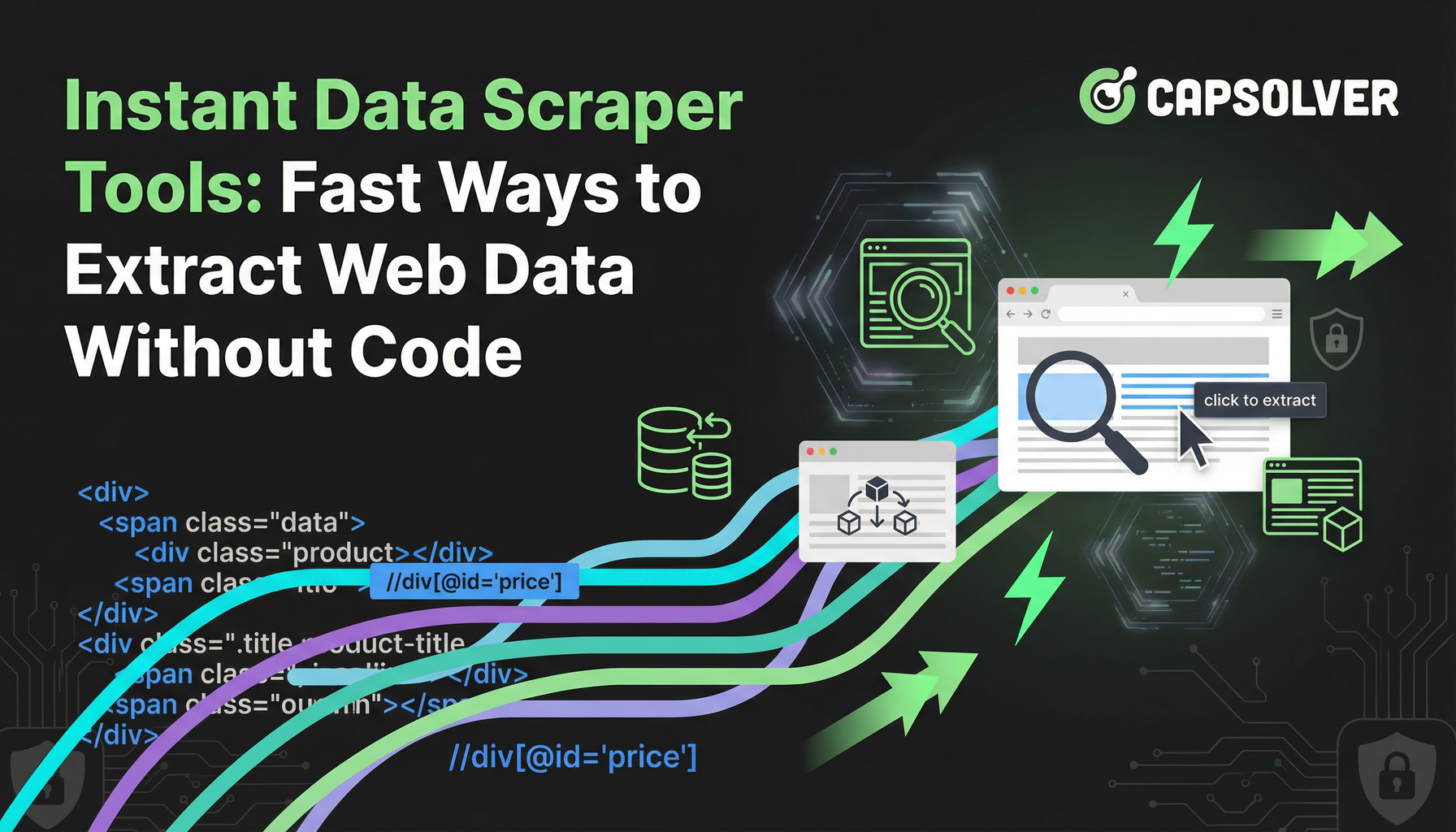
Instant Data Scraper Tools: Fast Ways to Extract Web Data Without Code
Discover the best instant data scraper tools for 2026. Learn fast ways to extract web data without code using top extensions and APIs for automated extraction.

Emma Foster
27-Jan-2026
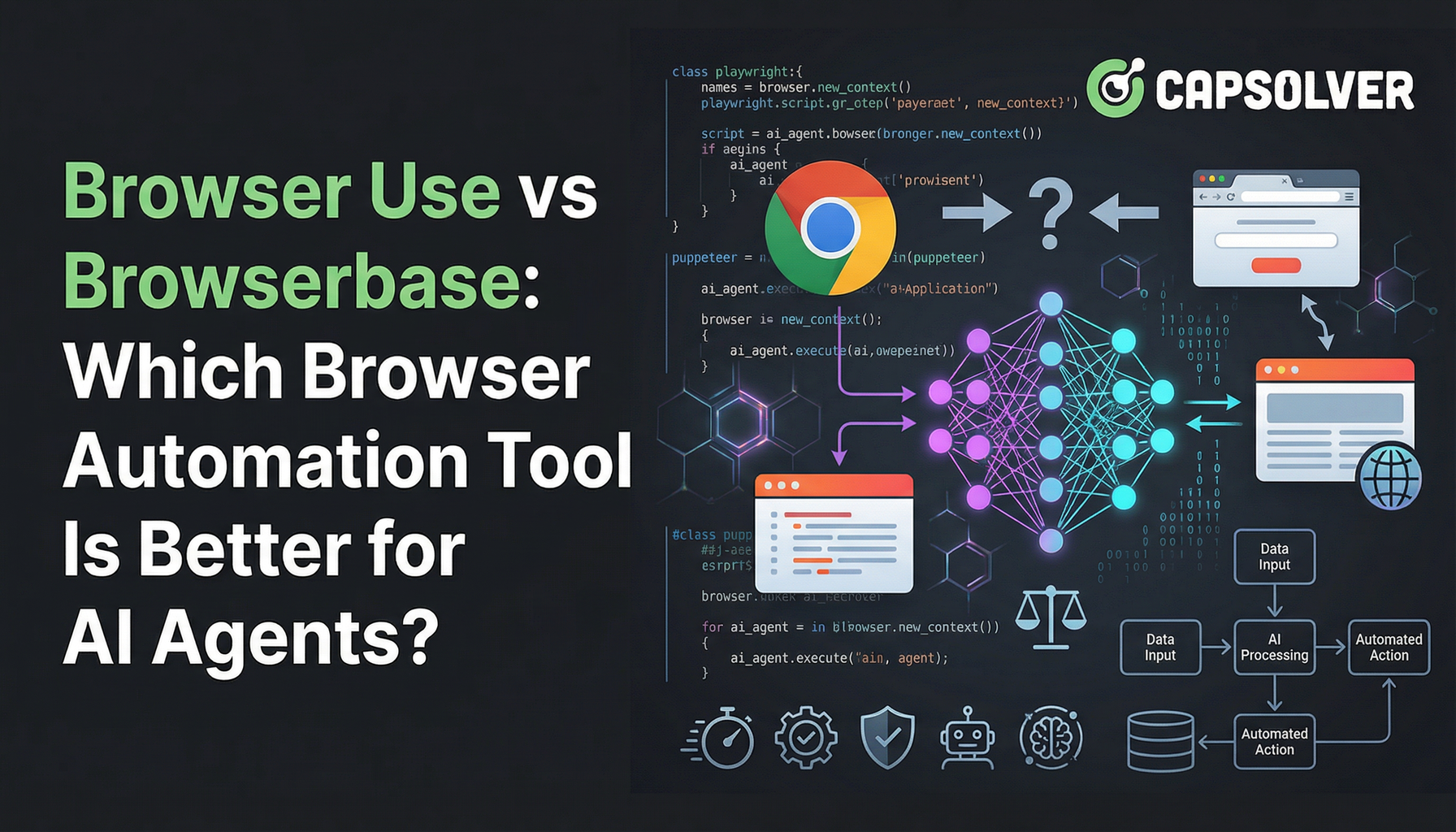
Browser Use vs Browserbase: Which Browser Automation Tool Is Better for AI Agents?
Compare Browser Use vs Browserbase for AI agent automation. Discover features, pricing, and how to solve CAPTCHAs with CapSolver for seamless workflows.

Anh Tuan
27-Jan-2026

IP Bans in 2026: How They Work and Practical Ways to Bypass Them
Learn how to bypass ip ban in 2026 with our comprehensive guide. Discover modern IP blocking techniques and practical solutions like residential proxies and CAPTCHA solvers.

Lucas Mitchell
26-Jan-2026
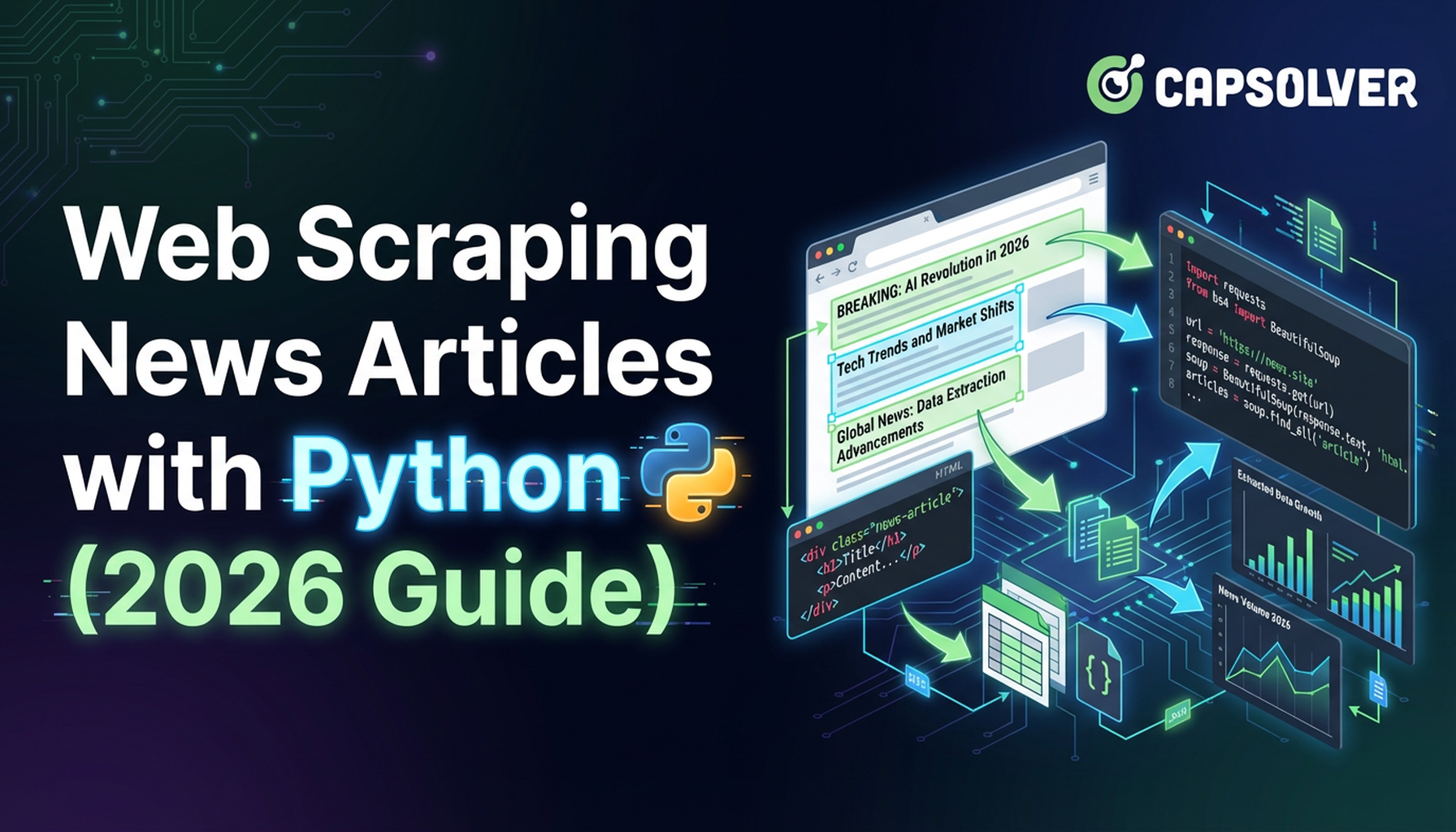
Web Scraping News Articles with Python (2026 Guide)
Master web scraping news articles with Python in 2026. Learn to solve reCAPTCHA v2/v3 with CapSolver, and build scalable data pipelines.

Ethan Collins
26-Jan-2026

